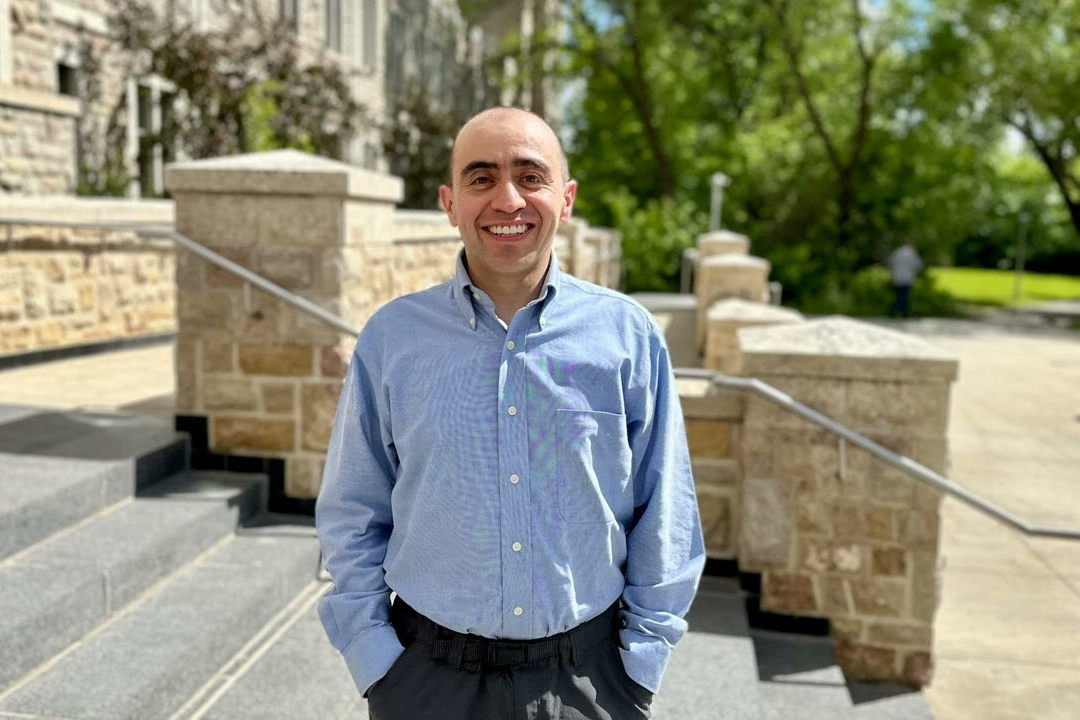
Innovating and bridging gaps in IBD care: Dr. Juan-Nicolás Peňa-Sánchez
Even as a teenager, Dr. Juan-Nicolás Peña-Sánchez (MD, PhD) could see stark differences in health for those who had medical coverage — and those without, thanks to his stepfather, an emergency department physician.
By RESEARCHERS UNDER THE SCOPE, OFFICE OF THE VICE-DEAN RESEARCHListen to all episodes of the Researchers Under the Scope podcast.
Researchers Under the Scope is produced by the Office of the Vice-Dean Research in the College of Medicine.
“I used to go with him sometimes on shifts to learn and shadow him,” said Peña-Sánchez said. “The healthcare system was quite fragmented and most of the population was not covered.”
In the 1990s, the Colombian healthcare system was reformed within the context of “neoliberal health reforms” promoted by the World Bank and International Monetary Fund, integrating privatization of the care delivery system, individual health insurance as the mechanism for receiving healthcare, the development of basic benefit plans, among other reforms.
“It changed the way to practice medicine,” said Peña-Sánchez, who observed among his stepfather and his medical school instructors’ grew dissatisfied with limits imposed under the new tiered coverage system.
Peña-Sánchez went on to work for non-governmental organizations in Bogotá, providing healthcare to individuals living in marginalized communities and with limited resources. After witnessing the inequities amplified by healthcare reforms, Peña-Sánchez began to analyze health systems themselves. He moved to Spain, Poland, and France to continue his graduate studies, and then to the University of Saskatchewan, where he joined the Department of Community Health and Epidemiology as an associate professor after researching physician satisfaction and alternatives to ‘fee-for-service’ payment models.
Still, Peña-Sánchez missed interacting directly with patients, and hearing their stories. Through the College of Medicine, he began learning about inflammatory bowel disease (IBD) and moved his focus to innovative models of care for IBD.
Canada’s high prevalence of IBD, particularly Crohn’s disease and ulcerative colitis, stood in stark contrast to his experiences in Colombia.
Peña-Sánchez formed the IBD among Indigenous Peoples Research Team after realizing in 2017 there was virtually no data on the incidence, prevalence or treatment of IBD for First Nations and Metis people.
“We learned that IBD is increasing among First Nations in Saskatchewan,” said Peña-Sánchez, who started zeroing in on disparities in those patients’ healthcare access and outcomes. Upon examining provincial administrative health data, Peña-Sánchez and his team observed that First Nations Individuals with IBD had fewer medication claims for IBD and a higher risk of IBD hospitalizations in comparison to individuals with IBD from the general population.
Furthermore, in another study, they identified that individuals diagnosed with IBD living in rural locations were less likely to have a gastroenterologist as their primary IBD care provider, lower rates of endoscopies, and a higher risk of IBD-related hospitalizations than their urban counterparts.
“Having that regular access is critical,” he said, advocating for innovative approaches to healthcare delivery.
Peña-Sánchez also explored the potential of virtual care, particularly telephone consultations, to improve healthcare access for rural populations. He found rural residents were more satisfied with telephone care compared to urban dwellers, an insight that underscores the need for adaptable healthcare models.
Currently, Peña-Sánchez is focused on patient navigation interventions to support individuals with chronic gastrointestinal conditions, particularly in rural Saskatchewan and for Indigenous community members. His research aims to improve access to specialized IBD care and patient outcomes through peer support and patient navigators.
